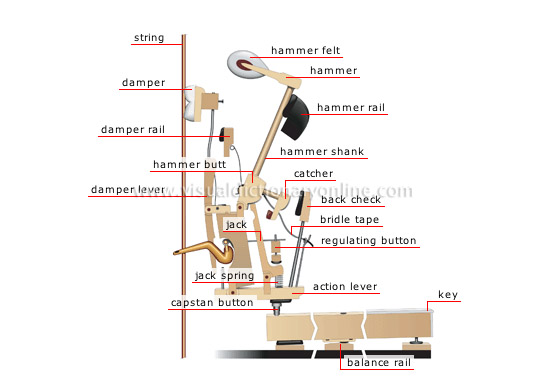upright piano action
Combination of elements whereby energy applied to a key is transferred to the hammer, which in turn causes the strings to vibrate.
hammer felt 
Felt-covered hammer head that strikes the string or strings and causes them to vibrate.
string 
The strings are: single and made of copper for the bass, double and made of steel for the mid-range, and triple and made of finer steel for the treble range.
damper 
Piece of felt-covered wood that rests on the string or strings to stop them from vibrating after the key is released.
hammer 
Piece of wood with a felt-covered end (head) that strikes one or more strings causing them to vibrate.
damper rail 
Felt-covered piece where the damper stem rests after leaving the string, allowing the string to vibrate.
hammer rail 
Felt-covered piece where the hammer shank rests when it falls back.
hammer shank 
Stem to which the hammer is attached.
hammer butt 
Piece that is pushed by the jack, directing the hammer toward the string or strings.
catcher 
Piece that holds the hammer halfway back so that a more rapid succession of notes can be played.
back check 
Metal stem whose felt-covered wooden head cushions the return of the catcher and prevents the hammer from bouncing back.
bridle tape 
Piece of leather that connects the catcher to a metal stem attached to the action lever; it pulls the hammer back when the key is released.
jack spring 
Spring that allows the jack to return to its position under the hammer butt once the key is released.
balance rail 
Piece on which the key balances.
key 
White or black lever pressed by the fingers to trigger a mechanism that causes the hammer to strike one or several strings.
action lever 
Movable piece that transmits movement to the jack.
jack 
Movable stem that transmits the movement of the action lever to the hammer butt and allows the hammer to fall back as soon as it strikes the string or strings.
damper lever 
Stem with a spring that brings the damper back against the string when a key is released.













